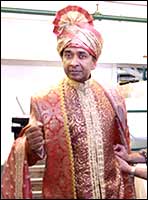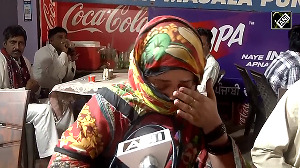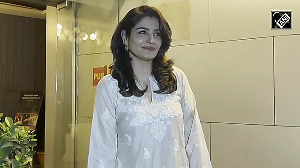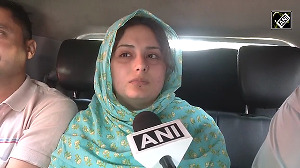 Marvin Ishmael has done his share of high emoting and a bit of singing for the moment.
Marvin Ishmael has done his share of high emoting and a bit of singing for the moment.
Now he has to spend some time with the costume designer who wants to check if the wedding suit prepared for him fits. He will wear it towards the end of Bombay Dreams, the Broadway musical, which features a qawwali at a wedding as the show races to a climax.
A reporter reminds Ishmael that he looks like Shashi Kapoor in Heat And Dust. "'I am a little old, right?" he says with a smile.
Ishmael, based in Toronto, plays the father of the young heroine in the much talked-about musical Bombay Dreams that opened for previews March 29 in New York and officially opens a month later.
Ishmael will face, like the rest of the cast, potentially 1,750 people each night at the Broadway Theatre on Broadway. It is one of the biggest theatres in New York. He reminds a reporter that he has opened the act for many Trinidadian artists and at some event there were over 8,000 people.
"But Broadway is Broadway," he says, adding that no one can take away Broadway's glamour and prestige.
Recently, he played the intriguing character Top Rani, a eunuch in Matka King, that was staged in several Canadian cities. A very powerful eunuch, Top Rani operates an illicit lottery through his brothel. And when a gambler, who is deeply in debt makes an unexpected wager, the stakes turn serious.
Can a fortune-teller and a 10-year-old girl beat Top Rani at his game? It is a character any actor would want on his resume, Ishmael asserts.
This interview was conducted part in person in the Broadway Theatre makeup room and part over the telephone. Like other lead actors in the show, Ishmael spent about 10 hours each day at rehearsals. He reached his temporary home in Queens, New York, by about 11 every night.
He talks with eagerness and authority so late at night that you wonder where he gets the energy from.
What happens to your character Madan in Bombay Dreams?
I play a movie producer who has had over a dozen flops after a successful career. He desperately wants to have a hit. He starts plotting to be a winner at last. Not all his plans are clean.
What else is interesting about this character?
It is not a one-dimensional character. He is deeply attached to his motherless daughter. There is a human side to him. The bond between father and daughter is interesting. Not many people in the West know about this kind of bond in our communities. I am sure they will be intrigued.
Did you always want to be an actor?
I think so. Even when I was in high school in Trinidad, I thought of an acting career.
What did your parents think about it?
My parents did not encourage me to see movies or to go to plays. But when they knew what I wanted to do, they backed me, especially my mother. My father was a bit reluctant.
What was your family background?
Like many families in Trinidad, there was intermarriage in my family. My mother's side came from a Hindu family in India and my father's side was Muslim.
But my mother, who had modelled for a year or two before she was on the family way, became a Christian. Eventually, my father became one too.
My mother worked as a bookkeeper for some time for a big company and my father was an electrical technician. He was quite a flamboyant character in his own right. I was blessed with loving and understanding parents.
Did you see desi films in Trinidad?
I don't remember seeing any, though Trinidadian Indians are crazy about Indian films.
 I believe a hit Indian film draws more people than a hit Steven Spielberg film over there.
I believe a hit Indian film draws more people than a hit Steven Spielberg film over there.
I believe so. But my mother, following her conversion, was not keen on me seeing films. I believe my father saw Indian films, but he would take me only to see films like Ben-Hur or King Of Kings.
But they did not stop you from going into an acting career?
Not at all. I was growing up when I was planning an acting career. I remember my mother getting catalogues from acting schools in Canada in the 1970s.
When did the family migrate to Canada?
Around 1974. By then I did not want to be anything but an actor.
Did you study acting in Canada?
For four years. I never looked for another profession. I have been an actor for 23 years, mostly on stage and a few times on television. I started a drama company to encourage multicultural theatre.
Were you conscious of not getting roles because of your colour?
Initially, I was. I knew, for instance, people often judged you by what you looked like. I was not just an actor to them. On the other hand, I was an actor of East Indian origin. It was all quite strange in the beginning. But I worked hard to let people know of my talent.
Did you get a chance to play colourblind roles?
I played an inventive engineer in an educational show. Nobody asked what colour the engineer belonged to. There was also a shortlived television show O'Brien. I had a colourblind part in it.
What are some of the memorable parts you have played in Canada?
I played the complex character of Victor Mehta in A Map Of The World by David Hare.
In New York, Roshan Seth played that part, which I believe was inspired partly by Sir V S Naipaul [A Map Of The World took a satirical and sharp look at East-West relationship, showing how troubled it could be, even at the best of well-meaning times]. It was a complex part in a complex and insightful play.
When did you audition for Bombay Dreams?
A few months ago. I believe I was the first person among the major players was chosen after a couple of tests.
What were doing when you got the part?
I was playing the eunuch character Top Rani in Matka King that was staged in Vancouver. Matka King was written by a very gifted Indo-Canadian, Anosh Irani. He has also written his first novel.
Did you sing any number from the show at the audition?
No. I did not because I knew basically it was not a singing role, and that I may just have one song to enact.
So what did you sing?
I sang a Gospel song. I did that for a particular reason. Whether one believes in Allah or Jesus or any other divinity, I have always felt God decides things for us. I have always felt the need to invoke the Divine and express gratitude.
You are acting in Bombay Dreams. Do you think it would have helped if you had seen a few Hindi films?
Not really. This show on Broadway is not like a send up to Hindi films as the London show was. This is a character-driven show on Broadway and it is enough I bring out good emotions as a father and a guardian of a motherless daughter. At the same time, I should bring out the other side of my character. But it is not as if I have not seen Indian films.
Where did you see them?
A local television channel in Toronto shows Indian films and songs. There are times my wife and I would watch some of the popular stuff and get very amused.
And why would that be?
Take for instance a funeral scene. Everybody is crying and suddenly in the midst of all that there is a song.
Click here for More Interviews






